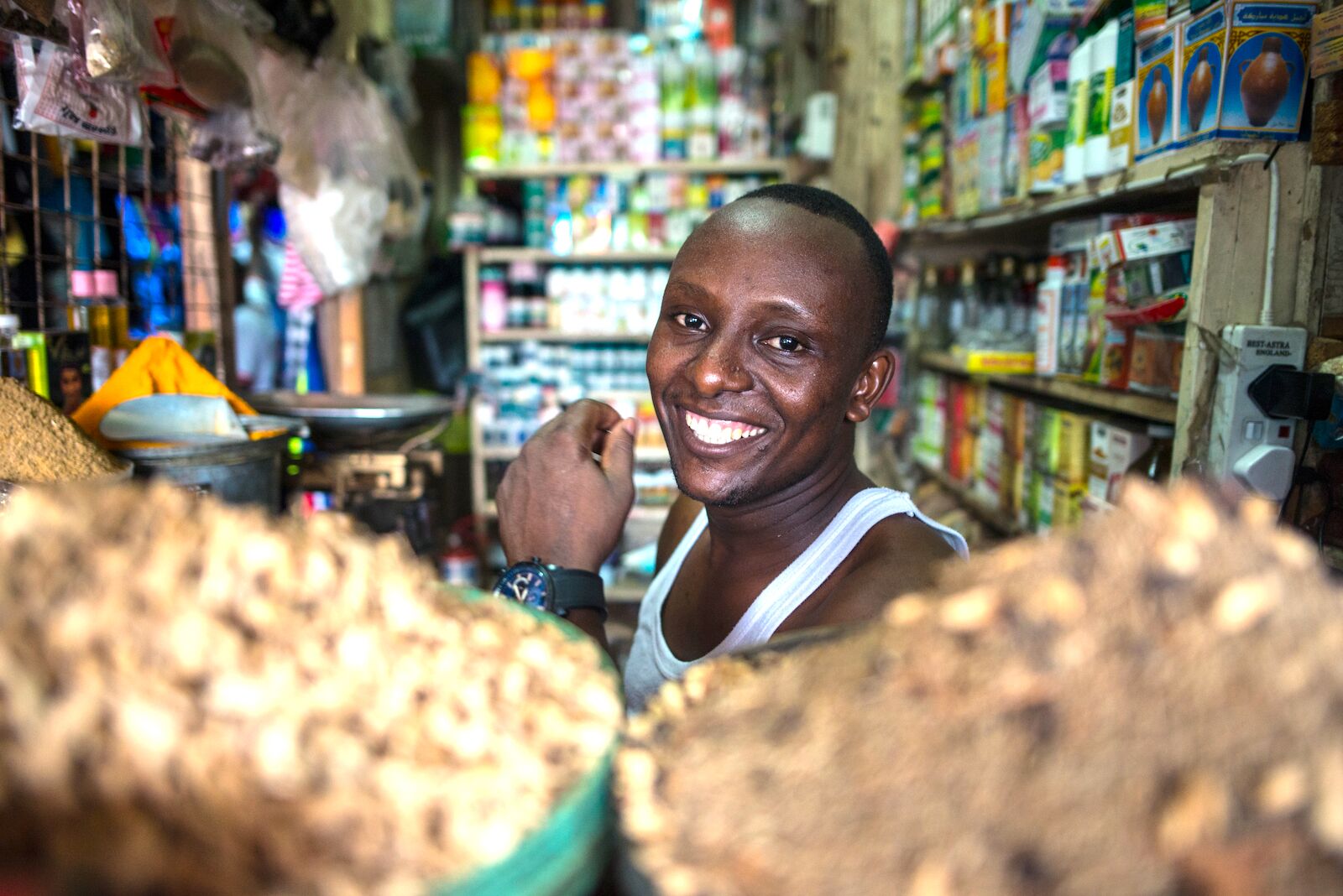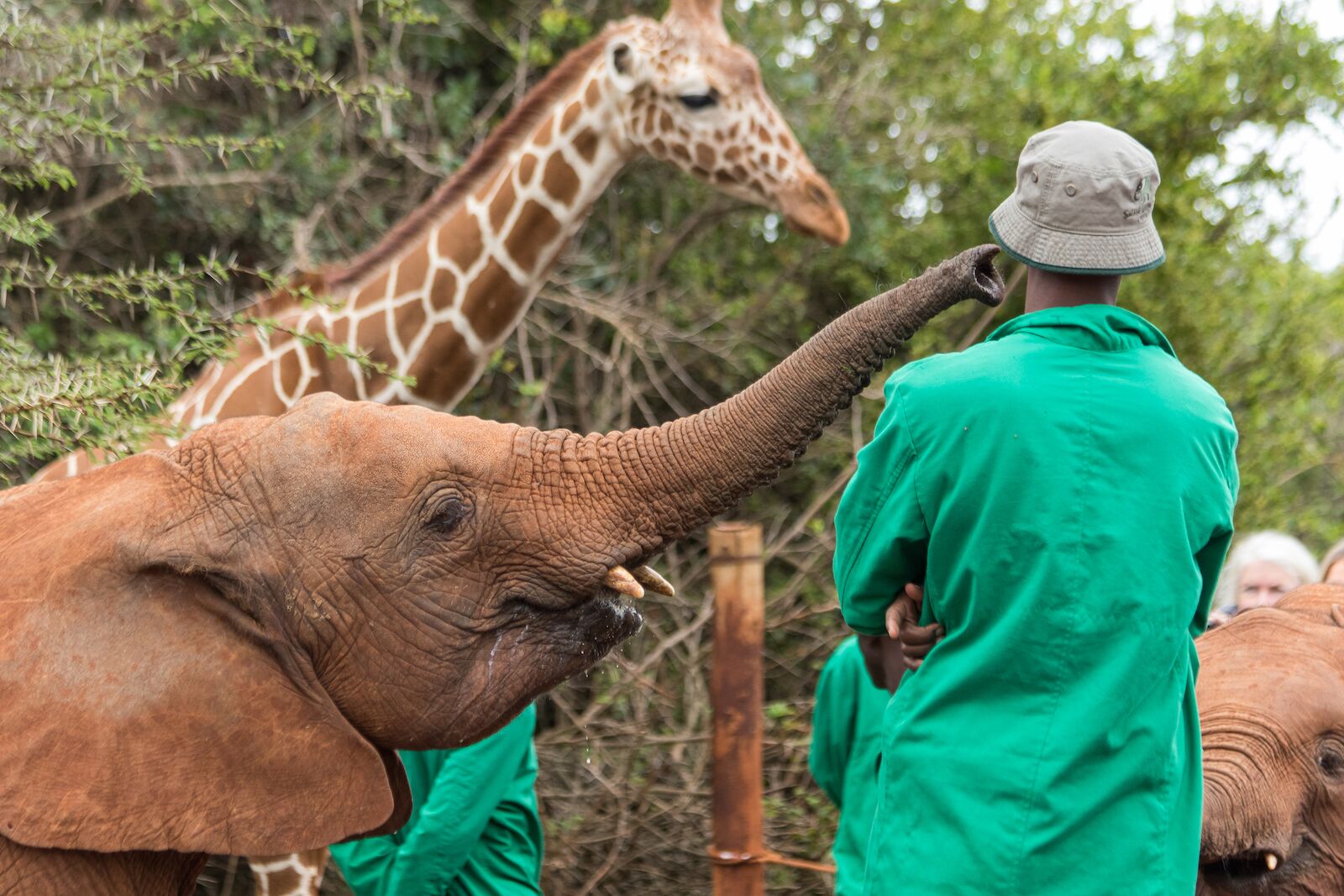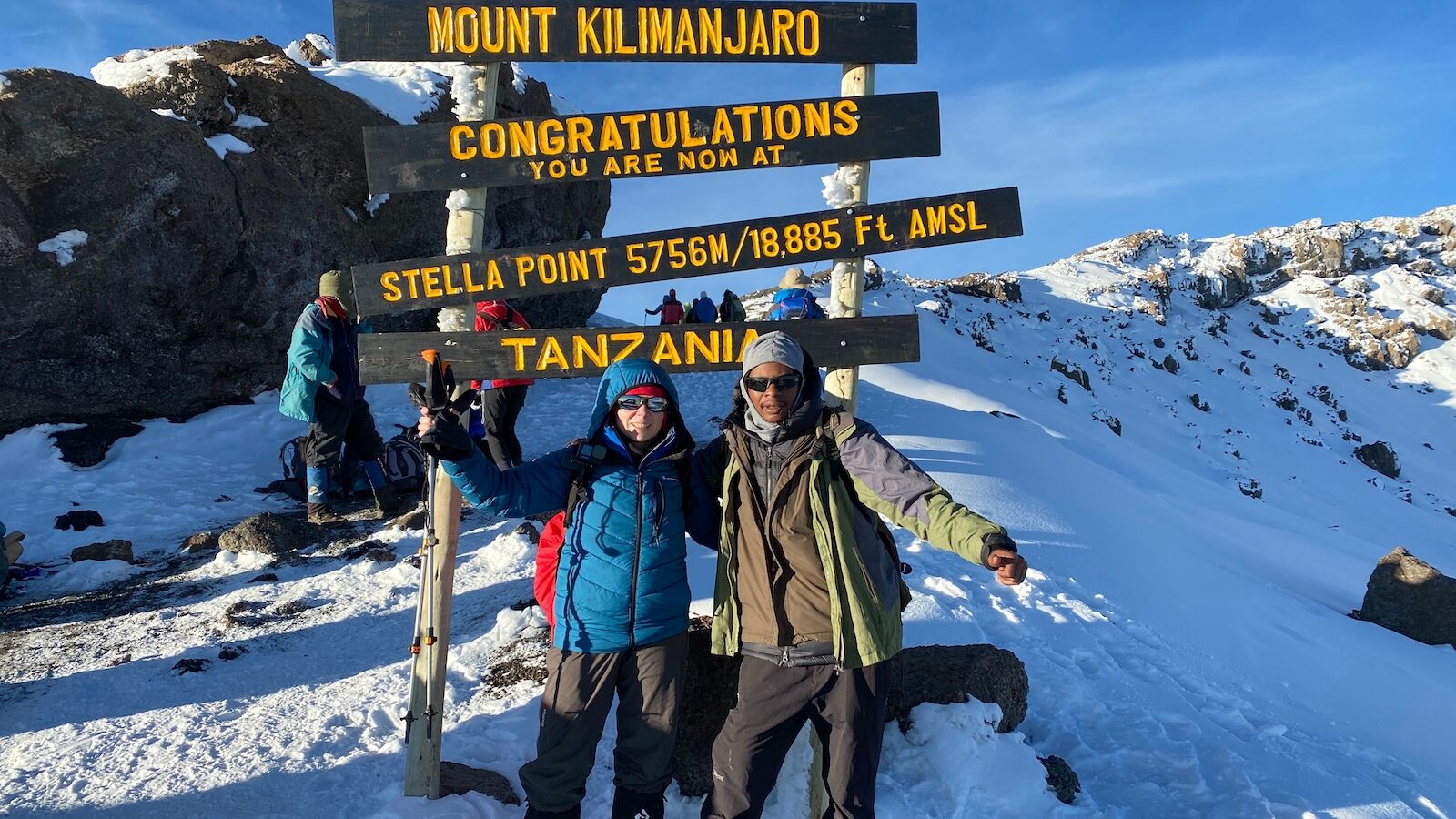This traveler’s guide to the Swahili language is designed to give those who plan to visit a Swahili-speaking country and want to connect deeper with the locals all the basic information they need.
The author:
Billy Oduory was born and raised in Nairobi, the one place where all dialects of Kiswahili are spoken. He studied Kiswahili from childhood in elementary and primary school. He also studied the language in secondary school as part of the curriculum in Kenya. He specializes in information systems at the University of Nairobi while working on other Kiswahili Language projects, including the Facebook Kiswahili translation program.
- Where is Swahili spoken?
- The difference between Swahili and Kiswahili
- The basics of the Swahili language
- Swahili pronunciation guide
- Common Swahili words and phrases for greetings and simple conversation
- Swahili words and phrases to use when ordering food
- Numbers in Swahili and phrases to use when shopping
- Swahili words and phrases you’ll need when moving around
- Animal names in Swahili
- Swahili words and phrases you’ll need while hiking and climbing
- Swahili words and phrases relating to lodging
- Swahili street slang you can use in casual conversation
Where is Swahili spoken?
Swahili is one of the official languages of the African Union (along with English, French, and Arabic) and is spoken by more than 200 million people. The United Nations estimates that, even though the Swahili language originated from East Africa, Swahili speakers can now be heard in more than a dozen countries: Tanzania, Kenya, Uganda, Rwanda, Burundi, the Democratic Republic of the Congo (DRC), South Sudan, Somalia, Mozambique, Malawi, Zambia, Comoros, and even in Oman and Yemen.
Swahili or Kiswahili?
The term Swahili is only used by outsiders to describe the language and the people who speak it. The correct term for the language, as used by locals, is Kiswahili, but both Swahili and Kiswahili are used interchangeably around the world.
The basics of the Swahili language
Before you throw yourself into learning Swahili words and pronunciation, here are some rules of the Swahili language:
- Unlike English in which the plural is indicated by the letter “s” at the end of most words, in Swahili, the plural is marked by a prefix. For example, “Mtu” means a person, while “Watu” is the plural meaning people.
– Kuna mtu mmoja kwenye lango. (There is one person at the gate.)
– Kuna watu wengi kwenye lango. (There are people at the gate.) - Swahili doesn’t have articles. There is no exact equivalents to “the” (a definite article) or “an” or “a” (indefinite articles) in Swahili.
Swahili pronunciation guide
- The best way to get your Swahili pronunciation right is to say the words as they are written on the page — in Swahili, there are no silent letters.
- To apply the appropriate stress in a Swahili word, look at its vowels. If the word has two consecutive vowels, this is where the stress will fall. For example, in the word “Maalum” (important), the stress falls on the first syllable.
- In Swahili, whenever two consecutive consonants occur in a word, no imaginary vowels should be added to make the pronunciation easier. For example, the word “Mji” (town/city) shouldn’t be pronounced “Muji.” Try to pronounce the “m” with your mouth closed so that the consonant makes a syllable on its own without a vowel.
- Swahili has no diphthongs, which means that sounds like “ai” like in “paid” or “ou” like in “bough” do not exist.
Here is a list of common sounds you should remember when pronouncing Swahili words.
| Syllable | Pronunciation |
|---|---|
| A | “a” as in pat |
| E | “e” as in pet, never “i” as in meet |
| I | “i” as in pick and pill, never “ai” as in pine |
| O | “o” as in pork |
| U | “u” as in put, never a short “u” sound like in cut |
| NY | “ñ” as in Kenya or mañana, the Spanish word for morning — for example, in Swahili, the term for monkey is nyani, so you should avoid saying “niyani” and try “ñani” instead |
| NG | “ng” as in jungle |
| DH | “dh” as in this |
| TH | “th” as in thought |
| CH | “ch” as in church |
| NG’ | “ng” as in song To better understand the difference between “NG” and “NG'”, please refer to this Swahili language workbook |
Common Swahili words and phrases for greetings and simple conversation
Formal and informal greetings are very similar in Swahili, so no one will fault you for using “Jambo” (hello) as your greeting in either setting or in any Swahili-speaking country.
You probably know the phrase “Hakuna matata” (no problem), but you can also try saying “Hakuna shida” (shida also means problem).
“Ni sawa” (it’s alright) is another phrase that you may use regularly.
The greetings in this guide will work everywhere and for every occasion.
| English | Swahili |
|---|---|
| Yes | Ndio/Ndivyo |
| No | Hapana/La |
| Now | Sasa/Sahii |
| Today | Leo |
| Tomorrow | Kesho |
| Monday | Jumatatu |
| Tuesday | Jumanne |
| Wednesday | Jumatano |
| Thursday | Alhamisi |
| Friday | Ijumaa |
| Saturday | Jumamosi |
| Sunday | Jumapili |
| Month | Mwezi |
| Year | Mwaka |
| Thanks | Asante/Nashukuru/Shukran. (To say “thank you very much,” use the word “sana” after any of these three) |
| You’re welcome | Karibu |
| Here | Hapa |
| There | Pale/Kule |
| Come | Kuja/Njoo (Kujeni/njooni for the plurals) |
| Go | Enda/Nenda (Endeni/Nendeni for the plurals) |
| Color | Rangi |
| White | Nyeupe |
| Black | Nyeusi |
| Red | Nyekundu |
| Green | Kijani Kibichi |
| Blue | Samawati |
| Yellow | Njano |
| Brown | Hudhurungi |
| My name is… | Jina langu ni… |
| Nice to meet you | Nimefurahi kukutana nawe |
| How are you? | Habari yako/Habari gani? |
| How are you doing? | Unaendeleaje? |
| Where do you come from? | Watoka/Unatoka wapi? |
| Welcome | Karibu |
| Goodbye | Kwaheri |
| Good | Nzuri/Njema (Use “sana” after these to say “very good”) |
| Bad | Mbaya (Use “sana” after these to say “very bad”) |
| Man | Mwanaume (Use “Wa” in place of “M” for the plural) |
| Woman | Mwanamke (Use “Wa” in place of “M” for the plural) |
| Child | Mtoto (Use “Wa” in place of “M” for the plural) |
| Boy | Mvulana (Use “Wa” in place of “M” for the plural) |
| Girl | Msichana (Use “Wa” in place of “M” for the plural) |
| Morning | Asubuhi (Good morning in Swahili is “Habari ya asubuhi”) |
| Noon | Alasiri (Good afternoon in Swahili is “Habari ya Alasiri”) |
| Evening | Jioni (Good evening in Swahili is “Habari ya jioni”) |
| Night | Usiku (Good night in Swahili is “Usiku mwema”) |
Swahili words and phrases to use when ordering food
The most common food you will find in restaurants in Kenya, Uganda, and Tanzania is ugali (maize meal), which is often served with meat and greens, especially sukuma wiki (a dish with collard greens).
Table manners are taken seriously in the region, so you need to be familiar with common courteous Swahili words such as tafadhali (please), subiri (wait), and samahani (sorry/excuse me).
When visiting a restaurant, the following Swahili words and phrases will help you get the best service.
| English | Swahili |
|---|---|
| Food | Chakula |
| Meat | Nyama |
| Vegetables | Mboga |
| Fruit | Matunda |
| Rice | Wali |
| Water | Maji |
| Wine | Divai |
| Hot | Moto |
| Cold | Baridi |
| Coffee | Kahawa |
| Tea | Chai |
| Bread | Mkate |
| Spices | Viungo |
| Hotel | Hoteli |
| Eatery | Mkahawa |
| What is on the menu? | Kuna nini kwa menu? |
| I am a vegetarian/vegan | Mimi sili nyama |
| Can I have the check please? | Nipe bili tafadhali? |
| The food is tasty | Chakula ni kitamu |
| More | Zaidi |
| Add | Ongeza |
| Less | Kidogo/Kiasi |
| Reduce | Punguza |
Numbers in Swahili and phrases to use when shopping
Photo: The Road Provides/Shutterstock
“Pesa” means money in Swahili, and most of the countries in East Africa use the shilling as their currency. In Congo, you will use the franc, commonly known as faranka.
In Swahili, once you can pronounce the numbers one through 10, the rest is a breeze. All you have to do is add the conjunction “na” (and) to get your numbers right. For example, 19 is “kumi (10) na tisa (9)”. One hundred twelve is “mia moja (100) na kumi (10) na mbili (2).”
Here is your guide to getting your numbers right and shopping easily in Swahili.
| English | Swahili |
|---|---|
| Zero | Sufuri |
| One | Moja |
| Two | Mbili |
| Three | Tatu |
| Four | Nne |
| Five | Tano |
| Six | Sita |
| Seven | Saba |
| Eight | Nane |
| Nine | Tisa |
| Ten | Kumi |
| Twenty | Ishirini |
| Thirty | Thelathini |
| Forty | Arobaini |
| Fifty | Hamsini |
| Sixty | Sitini |
| Seventy | Sabini |
| Eighty | Themanini |
| Ninety | Tisini |
| Hundred | Mia (“Mia mbili” is 200, “Mia tatu” is 300, etc.) |
| Thousand | Elfu (“Elfu sita” for 6,000, “Elfu kumi” for 10,000, etc.) |
| Buy | Nunua |
| Sell | Sell |
| Shop | Duka |
| How Much? | Ni pesa ngapi? |
| Price | Bei |
| Receipt | Risiti |
| I like this | Napenda hii |
| Can you please pack… | Tafadhali funga… |
| Change/replace | Badilisha |
| That’s too expensive | Hiyo ni ghali sana |
| I won’t take that | Sitachukua Hio |
| I want | Nataka |
Swahili words and phrases you’ll need when moving around
Moving around in Africa is easy when you have your own car, and with car rental companies in all the major cities, it’s easy to book a rental online and get it on arrival. Using public transportation will give you a better experience, however, which is why you will need to know how to tell a taxi/motorbike driver where you are headed.
Bodaboda (motorcycle riders) and tuktuk (three-wheeled motorbikes) are the best way to get around, and you can use taxi-hailing apps, such as Uber, Bolt, and Taxiye to request one just as you would a taxi.
Here are the key terms you need to know to get your directions and transportation right in Swahili.
| English | Swahili |
|---|---|
| Airport | Uwanja wa ndege |
| I need to get to… | Nahitaji Kufika… |
| Let’s go | Twende |
| Departure | Kuondoka |
| Arrive/Arrival | Wasili/Kufika |
| Fare | Nauli (Or just say “fare”) |
| Ticket | Tiketi |
| Bus stop | Stendi ya basi |
| Rent a car | Kodi gari |
| Board | Panda |
| Get off | Shuka |
| Stop | Simama |
Animal names in Swahili
Photo: Daniel Aloisi/Shutterstock
Your visit to Africa won’t be quite complete until you have visited a Mbuga La wanyama (game park/reserve) and seen some of the continent’s iconic wildlife.
Here are the Swahili names for animals and other phrases that will come handy in the East African wilderness.
| English | Swahili |
|---|---|
| Animal | Mnyama |
| Lion | Simba |
| Leopard | Chui |
| Cheetah | Duma |
| Hyena | Fisi |
| Wild dog | Mbwa mwitu |
| Elephant | Ndovu |
| Rhino | Kifaru |
| Buffalo | Nyati |
| Giraffe | Twiga |
| Zebra | Punda mlia |
| Wildebeest | Nyumbu |
| Impala/Gazelle | Swara |
| Warthog | Ngiri |
| Crocodile | Mamba |
| Hippopotamus | Kiboko |
| Bird | Ndege |
| Ostrich | Mbuni |
| Eagle | Tai |
| Storks | Korongo |
| Snake | Nyoka |
| Python | Chatu |
| Black Mamba | Mamba mweusi |
| Tortoise | Kobe |
Swahili words and phrases you’ll need while hiking and climbing
Photo: Chekard/Shutterstock
The best hiking experiences in East Africa are to be found on the trails going up snow-capped Mount Kilimanjaro and Mount Kenya.
Here are the Swahili translations for the common terms you will use while on a hiking trip. You can find more terms specifically related to hiking Kilimanjaro here.
| English | Swahili |
|---|---|
| Mountain | Mlima |
| Peak | Kilele |
| Forest | Msitu |
| Trail/Track | Njia |
| Snow | Theluji |
| Walk/Trek | Kutembea |
| Climbing | Kupanda |
| Descending | Kushuka |
| Slip | Kuteleza |
| Fall | Kuanguka |
| Tent | Hema |
| Shoes | Viatu |
| Shelter/Shade | Kivuli |
| Water bottle | Chupa ya maji |
| I need to rest | Nahitaji kupumzika |
| Be careful | Kua mwangalifu |
| Give me a hand | Nisaidie |
| I’m tired | Nimechoka |
Swahili words and phrases relating to lodging
To get your desired night’s rest, whether that’s a camp under the stars or a hotel, these are the terms you need to master.
| English | Swahili |
|---|---|
| Check in | Kuingia |
| Check out | Kutoka |
| Room | Chumba |
| Room service | Huduma ya chumbani |
| I want to book a room | Nataka kukodi chumba |
| How much per night? | Ni pesa ngapi kwa siku? |
| One night | Usiku mmoja |
| Two days | Siku mbili |
| Bed | Kitanda |
| Single room | Chumba chenye kitanda kimoja |
| Double room | Chumba chenye vitanda viwili |
| Bed and breakfast | Kitanda na chakula cha asubuhi |
| Toilet | Choo |
| Bathroom | Bafu |
| Room key | Kifunguo cha chumba |
Swahili street slang you can use in casual conversation
The purest Swahili is spoken in the coastal region where most ethnic speakers also live. As you go further inland, the use of slang increases due to the influence of the local languages. In Kenya, there is a whole slang version of Swahili called Sheng’.
Here are some of the most widely used Swahili slang words.
| English | Swahili |
|---|---|
| Hujambo? Sijambo | Are you alright? I’m alright (Plural: Hamjambo? Hatujambo) A greeting used both formally and informally instead of “Jambo” |
| Shikamoo? Marahaba | Same as above, but this greeting denotes respect and is used when addressing someone older than you |
| Vipi? | How? Used as a greeting for “How are you?” |
| Sasa? | Now? Common slang greeting for “How are you now?” |
| Za sasa? | What’s new? |
| Za kwako? | What is your news? |
| Hali?/Hali gani?/Uhali gani? | How are you feeling? “Hali” means condition/state |
| Mambo? | What’s up |
| Poa | Cool It can be used as a quick reply to all the greetings above |
| Tuko pamoja | We’re [in this] together. It can be used to mean “We agree,” or as a way of saying “Goodbye/See you later” |
| Twenzetu | Let’s go |
| Shwari | Calm/serene It’s used as a reply to any of the above greetings |
| Nimetulia | I am relaxed/I am better |
| Salama (Salmini) | Safe/okay You can also use it in the same context as Nimetulia (Say “Niko salama” for singular and “Tuko salama” if the greeting/question addresses a group) |
| Bomba | Nice/awesome |
| Hamna Noma | No problem |
| Kama Kawa | As usual |
| Safi | Clean It can be used as a response to slang greetings to mean “I’m all right.” You can also use it when referring to something nice |
| Freshi | Fresh It’s often used to describe something nice, but it can also be used as the reply to all the aforementioned greetings to mean “I’m good” |
| Fiti | Nice/Good It can be used interchangeably with “Freshi” |
| Baadaye | Later It can be used as a shortened version of “See you later” |
| Unaonaje/ Waonaje | What do you think? |
| Kutakuwaje? | What next? |
| Kudishi | To eat |
| Mlo/Msosi | Food |
| Sembe | Another term for ugali (maize meal)  |
More like this
Languages6 Swahili Phrases You'll Learn Climbing Mount Kilimanjaro


